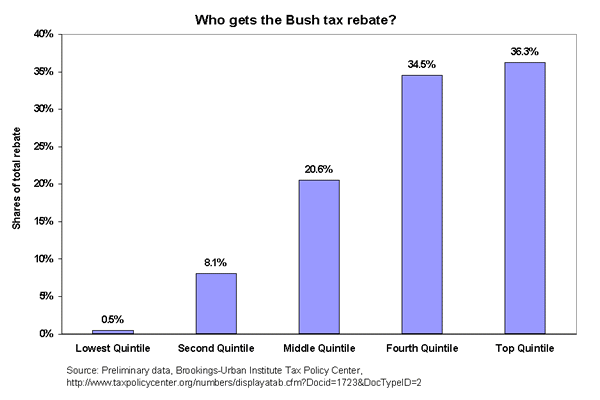See Snapshots archive.
Snapshot for January 23, 2008.
Missing the target
The Bush tax rebate fails on effectiveness and fairness criteria
Many policy makers and economists now agree that an economic stimulus package is needed to offset the slowdown in the U.S. economy. The Bush administration has floated a $145 billion plan, with $100 billion devoted to a tax rebate and the remainder earmarked for businesses. Final details have yet to be formally announced, but indications are that the president will propose a temporary elimination of the 10% federal income tax bracket. While such a rebate can help boost lagging demand by putting more money in consumers’ pockets, the White House plan suffers from very poor targeting, and thus fails on two critical criteria: efficiency and equity.
As the Chart below reveals, over 70% of the rebate goes to the top 40% (income above $47,000) and less than 10% reaches the bottom 40% (income below $27,000). According the analysis by the Brookings-Urban Institute Tax Policy Center, 55.9 million households get no rebate at all from the plan, in part because many households pay no federal income tax. Most of these households, however, do pay other forms of taxes, such as payroll taxes on their earnings.
The economic research on effective stimulus is quite clear on this point: there is a greater bang-for-the-buck from rebates targeted at lower-income households than higher-income ones. As the Congressional Budget Office put it in a recent report:[PDF] “Lower-income households are more likely to be credit constrained and more likely to be among those with the highest propensity to spend. Therefore, policies aimed at lower-income households tend to have greater stimulative effects.” Given the well-documented increase in income inequality in recent years, excluding low-income households from the rebate also fails on the criterion of fairness.
For a tax rebate to be both more effective and more equitable, it should be targeted at low- and moderate-income households. One way to do this is to provide a rebate to all taxpayers, including those that have payroll tax liability, not just to those who pay federal income tax (see EPI’s growth package).

